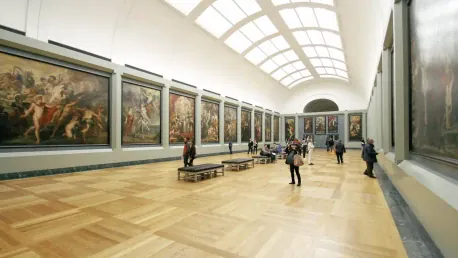The recent announcement of Moscow’s Gulag History Museum’s temporary closure, ostensibly due to fire safety violations, has stirred considerable concern among various segments of society. The institution, providing an essential chronicle of the Soviet Union’s extensive network of forced labor camps, has stood as a vital educational resource since its establishment in 2001. Critics believe this closure reflects a broader effort by Russian authorities to diminish acknowledgment of Soviet-era repression. The museum’s latest event, honoring the Day of Remembrance of the Victims of Political Repressions, was particularly salient because the Moscow Mayor’s Office had obstructed this public commemoration since 2020. With no clear timeline provided for reopening, the museum’s assurance of ticket refunds does little to mitigate public anxiety about its future.
The move evokes a profound sense of loss and fear among the museum’s visitors and supporters. Mikhail, a concerned citizen, voiced the dread of a potential permanent closure, underscoring the museum’s crucial role in educating people about historical atrocities to prevent their recurrence. On the other hand, Yulia, a Stalinist musician, downplayed the importance of such establishments, arguing that death is a constant throughout eras, and it is impractical to create monuments for every period. This divide among public opinion illustrates the contentious nature of historical memory in Russia, where some see the preservation of history as a necessary deterrent against the repetition of past mistakes, while others view it as an unnecessary fixation on bygone eras.
Historical Precedents and Broader Implications
The closure of cultural institutions on the grounds of fire safety violations is not unprecedented in Russia. For instance, the Documentary Film Center faced a similar fate in 2022, and the European University of St. Petersburg was shut down in 2008. Such actions raise suspicions about whether fire safety concerns are genuine or a convenient pretext for silencing institutions that delve into parts of history which may be uncomfortable for current political narratives. This trend aligns with recent legal actions that have reclassified thousands of victims of Soviet repression as “traitors of the Motherland,” signaling an unsettling shift in the state’s stance toward its historical narrative.
Interestingly, these legal actions and institutional closures appear in concert with increasing restrictions on independent journalism and nonprofit organizations. The Moscow Times, itself designated as an “undesirable” organization by Russia’s Prosecutor General’s Office, faces accusations of discrediting Russian leadership decisions. Despite substantial obstacles, the publication remains steadfast in its commitment to accurate and unbiased reporting. This antagonistic environment for media and educational institutions underscores the broader struggle between preserving historical truth and the concerted efforts to reshape or suppress elements of the past that clash with contemporary political interests.
Preserving Historical Memory Amid Political Challenges
The recent temporary closure of Moscow’s Gulag History Museum, allegedly due to fire safety issues, has alarmed many. This museum, vital for its depiction of the Soviet Union’s forced labor camps, has been an educational cornerstone since 2001. Critics argue that this closure is part of a broader effort by Russian authorities to minimize recognition of Soviet-era oppression. The museum’s last event, commemorating the Day of Remembrance of the Victims of Political Repressions, was especially significant since the Mayor’s Office had blocked this public observance since 2020. With no clear reopening date, the museum’s offer of ticket refunds does little to ease public worry about its fate.
Many feel profound loss and fear, such as Mikhail, who stresses the museum’s importance in teaching about past atrocities to prevent them from happening again. Conversely, Yulia, a Stalinist musician, dismisses the need for such places, arguing that death is a constant and building monuments for each era is impractical. This division reveals the contentious nature of historical memory in Russia, where some view preserving history as essential to avoid repeating past mistakes, while others see it as an unnecessary preoccupation with the past.









